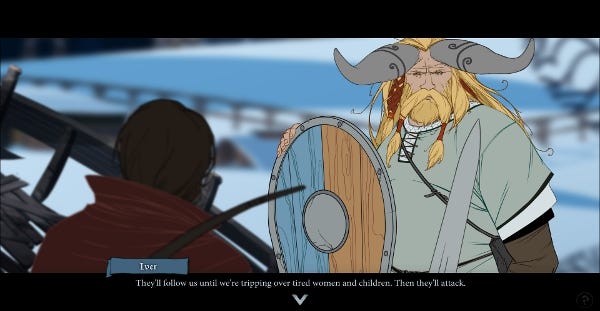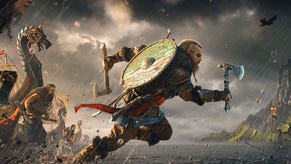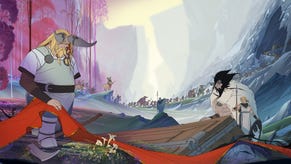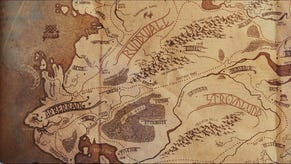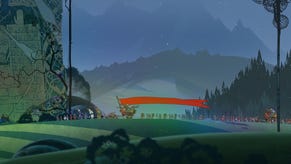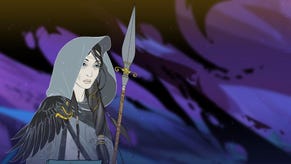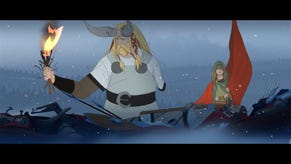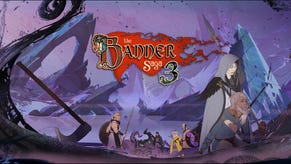Impressions: The Banner Saga's Single Player Story
Oregon Trail With Vikings
Multiplayer smart-o-battler The Banner Saga Factions might be out and (mostly) free for all, but even the former BioWare-ites at Stoic will readily admit that it was always a sideshow. The Banner Saga is, at heart, a story and a place. It's a world in conflict, sure, but pensive Viking biffery is only one piece of a much larger, more varied puzzle. I recently got to spend a few hours with chapter one of the Kickstarter darling's single-player campaign, and it prompted many thoughts. Here they are, freshly scooped from my brain and dribbled onto a page for your enrichment.
I am not meant to be a leader. In that sense, the main character (of a very large, frequently alternating cast) I played and I had a lot in common. Hakon was an icy mountain of a Varl – and a high-ranking one at that. But he was merely second-in-command, the studded, bone-shattering mail gauntlet to the Varl head, heart, and brain that was Vognir. Hakon knew how to break people, not inspire them.
Shortly into my treacherous trek in Hakon's shoes, Vognir died. It was a plot-mandated death, but there were no theatrics, no cackling cliché villains or maniacally orchestrated plans to Take Over The Entiiiiiiiire Varl World (Varld). He'd rushed off to stop humanity's hotheaded prince, Ludin, from getting in over his head with a band of Dredge, Banner Saga's lumbering oblivion. Now, Vognir had sent plenty of Dredge to scrap heap in his day. They were monstrous, sure, but not unkillable. But this time was different. And it was different because it just... was. He made a mistake, and that was all it took.
This moment was significant for multiple reasons: 1) Because that forced Hakon – aka, me – to start calling the shots. He wasn't happy about it, but a colossal caravan of Varl, humans, and peasants of all shapes and sizes wasn't going to lead itself. And 2) Because it drove home a very important point: The Banner Saga's howling snowscape is not a nice place. Each and every step clomps against emaciated ice. Eventually, inevitably, that ice will shatter – whether you're the most helpless of villagers or the mightiest of kings. Life is fragile. Make every decision count.
The Banner Saga's story mode does not feature permadeath. Not as a consequence of normal, no-frills battle, anyway. But I can't think of a game I've played in recent memory where each and every choice I made felt so heavy. I went from telling tiny squads which squares to move to while fighting drunks (that was a fun tutorial) to managing a powder keg caravan of thousands. And if I didn't keep it all together? If the whole thing went sky high, if I didn't placate the spoiled human prince, if I didn't show my Varl legions that I was just as firm yet wise as their old leader, if I didn't keep our supplies topped off, if I didn't get rid of the spoiled supplies some grateful merchant accidentally gave us when we saved his life, if I didn't, if I didn't, if I didn't...
Then the ice would break. Characters I came to respect (if not necessarily befriend) would leave or die. Already tenuous Varl-human relations would be ruined. I'd have so much blood on my hands that I'd basically be drowning in the stuff. The Dredge – once scattered and disorganized, now unified for some mysterious purpose, inky lips smacking hungrily for conquest – would follow through with their war effort in earnest, and nobody would be even the slightest bit prepared. Everyone would be sad. No one would love me. The Dredge would hold celebrations to commemorate my cowardice, parades to spit on my banner. They'd tuck their ink blob children in at night with tales of their genocidal extermination of all magnificent viking beards – how it began with mine.
It was basically ultra-high-stakes Oregon Trail. Every few overworld steps brought some new decision, event, or disaster – of which battle was only one. And it wasn't even close to the worst. It was actually kind of bizarre: I liked a lot of my caravan's more visible members (many of whom I could converse with when we stopped to camp), but we got along about as well as Oregon Trail and my grades in elementary school computer class. So we'd trade verbal barbs, and oftentimes alliances, supplies, troops, and lives hung in the balance.
And it was frustrating. It was frustrating because I couldn't be everything for everybody. For every one person I pleased, I pissed off another ten. But keeping people happy and keeping them alive, as it turned out, were two very, very different things. Going off the beaten path to rescue a village from Dredge assault might have sounded like the right thing to do, but was it really? For my steadily dwindling troops? For my tired, hungry peasants? For morale? For the respect of my best fighters? Playing hero, as it turned out, was rarely practical.
I had to deal with everything from unruly, nameless grunt soldiers to a self-described “witch” who spoke exclusively in maddening riddles, but my favorite foil was actually Prince Ludin. He joined my group by (un)happy accident when our purpose was merely to deliver collected taxes back to the Northern King, and he quickly revealed what I thought to be his true colors. Bratty, entitled, reckless. Idiotic. Endless bark with all the bite of a teething jellyfish. I think my group's wispy haired, hunched yet still towering Varl scribe said it best: “He looks for all the world the sort of boy who grew up pulling the legs from spiders.”
But just when I thought I had him pegged, he surprised me. At the outset of a pivotal battle, he wanted to run off to war and glory. I wanted to send him away altogether – to safety, to stop him from hurting himself or, by proxy, anyone else like he did with Vognir. And of course, because he was the linchpin in the Varl-human alliance. He refused. He wanted to fight for his people. And then – without spoiling anything further – he dropped an ultimatum, and I had to concede the confrontation to his royal obnoxiousness and his snooty, upturned-to-the-point-of-stabbing-god-in-the-eye nose. I wanted to hit him.
The game then proceeded to give me the option to knock him unconscious and send him away. I was really angry. I wanted to. But I realized that it would've split my troops, been terrible for the alliance between Varlkind and humanity, and – worst of all – it wouldn't have made the prince any less correct. Again: frustrating – but in a way that's sadly absent from most games. Leadership isn't about coordinating the synchronized march of a thousand lapdog-loyal drones. People have goals and priorities. You might be calling the shots, but that doesn't mean characters have to listen. Moreover, leadership doesn't mean you're implicitly correct. Not by a long shot.
In another instance, I'd just finished up a grueling war campaign when disaster struck. Our most important wagon – the one that contained the money we were delivering to the King – slipped on ice and went careening over a cliff. At the last second, one of my best Varl fighters caught it in a crushing grip (he looked for all the world the sort of Varl who grew up pulling legs from rhinoceroses), but that left him dangling over the hungry mouth of an abyssal ledge. It quickly became apparent that it was either the wagon or his life, and he refused to let go. He was doing his duty, and if he had to die for our cause, then so be it.
But it was just money. This fighter, meanwhile, was a good man and a fantastic combatant on the battlefield. I wasn't ready to lose him. So – after a quick yet brutal war of words – I ordered him to drop the wagon. He complied, and the wagon splintered against the rocks below. But I saved his life. Hooray! Except that he hated me for it. The Varl prized honor, duty, and bravery over life, so I'd just handed him a fate worse than death. Oof.
The Banner Saga's approach to its genre, then, is a really, really interesting one. Battles themselves are like ever-evolving chess matches, but the world keeps on turning when you're not outsmarting and out-smiting living embodiments of darkness. And that ties back into battle in very tangible ways. Party members can and will die or leave if you're not careful, and sometimes it's even advantageous to part ways with your best and brightest. For example, at one point I had the option of sending my first spearman back to The Strand, the game's biggest city. On one hand, I'd have lost a really useful character, but on the other, he would've been able to aid and protect refugees – in turn granting me heaps of a stat called Renown, which among other things let me deck my characters out with new skills and abilities.
Battles themselves are still meaty, heavily positioning-based takes on the classic turn-based strategy RPG formula pioneered by games like Tactics Ogre/Final Fantasy Tactics. Basically, if you played F2P multiplayer spinoff The Banner Saga factions, you'll have a pretty good idea of the nuts and bolts of single-player as well. Battles were tough and the AI rarely pulled punches, but I never felt like the game was being unfair. It does, however, bear mentioning that enemy special abilities weren't switched on in the build I played, so I can only discern so much.
Single-player battles do have one major twist, though: war. Like its graphically lackluster, egregiously story-less forebear Chess, The Banner Saga's combat is an abstraction of a much larger conflict – one with numbers that quickly escalate into the thousands. When your caravan comes across potential war scenarios, your conglomerate of nameless, faceless human and Varl fighters joins the fray. If they total out to, say, 700 while the Dredge force you've encountered can only manage a paltry, say, 400, then you'll probably come away with only minor scratches and bruises.
But what if the scales tip in the opposite direction? Well then you can opt to make your party's personal battle(s) tougher in order to take pressure off your combatants and the icicle-brittle peasants they've been charged with protecting. At that point, you pick the Charge option, and then the caravan screen fades into a typical (though again, markedly tougher) tactical battle with a normal party size. If you win, you can opt to fight another battle and leave your troops with a definitive upper hand, or you can cut your (already reduced) losses and call it a day. Bear in mind, however, that damage transfers over, and downed party members stay down. It's entirely possible that you'll be too banged up to dredge up more Dredge.
As of now, this is Banner Saga's solution to the problem of players who easily make mincemeat of AI opponents and then slurp their fingers, hungry for a more substantial meal. It's an interesting one, but I'm not entirely convinced. Way I see it, that just means skilled players fight two easy battles instead of one. Again, though, the AI often gave me all I could handle (even without access to special skills), so I'm not too worried.
Some players, however, might take issue with Banner Saga's presentation. Yes, I say this about the game with the eye-searingly gorgeous classic-Disney-level animation. What you have to realize, though, is that Banner Saga is still being made under tremendous budgetary constraints – relatively speaking. Kickstarter was kind to Stoic, but not kind enough for an entire movie's worth of obsessively crafted animation. Only important scenes, then, get the full Beauty and the Varl treatment. The rest of the story is told through (admittedly very well-written) text accompanied by largely unmoving characters, sound effects, and lavish scenery. It all still looks quite nice, but just be warned that it might not be exactly what you were expecting.
The Banner Saga's single-player really did impress me, though. It's still very obviously rough-around-the-edges (and it's still missing a few of said edges, to boot), but there's heaps of promise. I felt like an incompetent, indecisive leader every trudging step of the way, and it was magnificent. The Banner Saga's world is a harsh, frigid place, and its cast of characters are far from simple lockstep lackeys. If you want their respect, you'll have to earn it. Sometimes that means making tough calls – ugly decisions that'll twist and writhe around inside your guts for days to come. But that's leadership for you. It's not about being loved. You get results, and you worry about popularity contests later.
And in the meantime, you take solace in the fact that at least you have a really, really cool beard.
